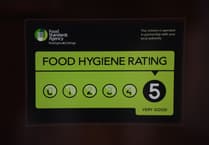Thursday, April 12, 1923
Folk in Gulval were up in arms about the stench pervading the village courtesy of the Ridgeo fishmeal factory, and had sent a deputation along to a meeting of West Penwith District Council, in the hope of getting some action.
Villagers had put up with smell for a year, and - with summer on the way - were becoming impatient. 101 residents had signed a petition, and some said they dared not open their windows, fearing that the fumes were not only unpleasant but unhealthy.
The factory owner, Mr Bazeley, said that he had done all he could, but admitted that putting in new condensers had failed to do the trick. He was now prepared to lay pipework down to the sea, to conduct noxious vapours into the Bay.
Bazeley was certain, however, that the smoke from the chimneys could not possibly smell unpleasant, and wondered whether all the complainants were quite sure that his factory was actually the cause of the problem.
The council remained convinced that it was, and gave Bazeley one month to sort things out – or have his factory closed down. But this may not have pleased poultry-keepers, who – according to the Ridgeo advertising – could expect to see an increase of nearly 30 per cent in egg production once they switched to Ridgeo. Hens reportedly loved the stuff: each one fed on the Gulval factory’s fishmeal would lay on average an egg for every weekday, with some left over for the weekend.
Tuesday, April 17, 1923
A high level summit of experts, officials and local politicians met to discuss the state of the road between Penzance and Land’s End.
Those involved included the Cornwall County Council surveyor, local councillors safeguarding the interests of Paul and West Penwith, and Colonel Stannard, representing the Ministry of Transport.
With the summer season about to begin, and motor traffic (especially charabancs) increasing, there was agreement that something had to be done about the ‘derelict’ condition of the road. But as yet, no agreement had been reached as to who should pay.
The County Council had, however, worked out how they would like the cost - £93,000 - to be divided. Half would be borne by the Ministry (now the Department) of Transport, £23,600 by the ratepayers of West Penwith, and most of the remainder by the County Council – although Paul would still have to stump up £2,900 for the half mile or so of road for which they were responsible. The cost had increased, partly because ‘bituminous material’ – basically, tarmac – was now considered a vital extra if the road was to be designated ‘first class’ – what we would call an ‘A’ road.
The local councils were not at all happy, and argued that their ratepayers – who were not particularly keen on day trips to the edge of the world - would gain little benefit from the proposed improvements.





Comments
This article has no comments yet. Be the first to leave a comment.